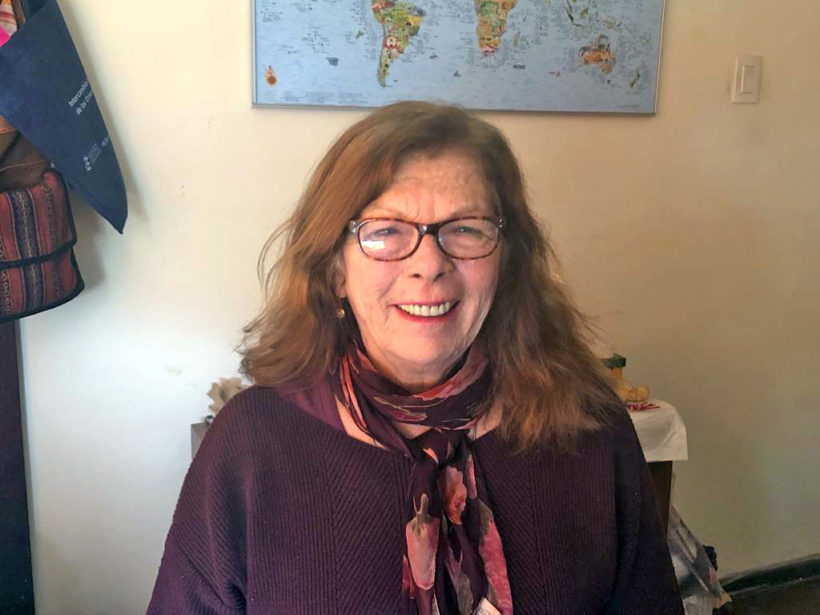Madeleine John, Peruvian, has been a member of the Humanist Movement since she was very young. Today, from Silo’s Message, she summarises her activism by saying: “The guiding thread of my life has been to try to contribute to a culture of non-violence and non-discrimination”.
In this interview with Pressenza he addresses the most important issues to which he is applying himself.
The world we aspire to
In the face of what she describes as a “global crisis where everything is falling apart and nobody believes in any institution”, Madeleine rescues the evident birth of a new world to which thousands of people from all latitudes are contributing in feminist, ethnic cultural, ecological, anti-war collectives…
“I believe that the world to which we aspire needs to overcome the old form of guilt and punishment. We need to move towards a culture of reconciliation and reparation, otherwise such a world will not be possible.
From Silo’s Message, I try to contribute and deepen that path of reconciliation and reparation as I can, working on a personal level. I believe that by recognising how resentment affects our lives, by seeing in ourselves the change that reconciliation implies, we can move forward.
Reconciliation as a choice
Madeleine points out how resentment and the quest for revenge are often justified “in what others have done to us”.
“Yet we all have experience of how, faced with the same situation, some react with enormous anger and cry out for punishment, while others “react with a human greatness that I find moving.
Then one understands that it is a choice that has to do with the direction of one’s life, with what one wants to build and the person one wants to be… I can decide to respond with understanding and reconciliation, or go down the path of resentment and seeking revenge and punishment”.
Resources and process
After stressing that the change she proposes is a process, Madeleine says that “we must make an effort to broaden our view”, because resentment magnifies the negative in others and dehumanises them. She proposes to recognise the other’s mistakes, compulsions, clumsiness, weaknesses, “to reconnect with their humanity”.
“This effort also leads me to try to understand the factors, the circumstances that surrounded the painful situation and made it possible.
Sometimes, there is the prejudice that when one is reconciled, the struggle to change things loses strength. My experience is that this is not the case, on the contrary. But I believe that when you understand the circumstances that made the situation of violence possible and you connect with the humanity of the other, it really gives you courage and strength and commitment to try to change these circumstances. It actually strengthens our drive for change and our struggle for a better world.”
Social reconciliation
“On a social level, the issue is very complex, because it has a lot of different edges. With some friends we tried to work on it, but we were overwhelmed… There are many underlying beliefs that support this conception of guilt and punishment, a very zoological view of the human being, almost of animal domestication… The belief, for example, in the efficacy of violence, in suffering as an ‘educational’ factor.
There are many very interesting attempts being made in this sense, such as the Truth and Reconciliation Commissions in different countries, but still with many problems. So when we felt unable to respond to such a complex issue, I decided to recognise my limitations and move forward from smaller environments, from the grassroots, from my own collectives. I believe that to the extent that we experience the extraordinary change that reconciliation implies, I believe that more and more people will begin to see how to move towards a broader, historical reconciliation between peoples.”
Neither forgetting nor forgiving
Although she recognises that the subject has been “much abused”, Madeleine is categorical in affirming that “reconciliation has nothing to do with forgetting”.
“There are certain things that are not forgotten and one of the problems in social reconciliation is that we also need a historical review, because our history – which has been written by the powerful – does not include the voices of all the actors. There are many things that have been covered up, that have been denied or made invisible. We need to see them, to recover them.
Forgetting does not allow you to reconcile in any case, so this historical review is not to forget but to understand in depth the process we have lived through and also to recover the good”.
He gives the example of the vigorous feminist movement that not only denounces the millenary violence against women, but also rescues their enormous contributions.
“Social reconciliation has many aspects, but it certainly has nothing to do with forgetting or with impunity, which is always raised by some interested groups who misuse the issue to cover up their crimes. Neither forgetting nor forgiveness: reconciliation!
Finally, Madeleine invites further reflection on the subject through the documentary “Beyond Revenge” by Luz Jahnen and Álvaro Orús and offers to send materials to those interested in contacting her.
“I encourage everyone to move forward on this path of reconciliation,” she concludes.






